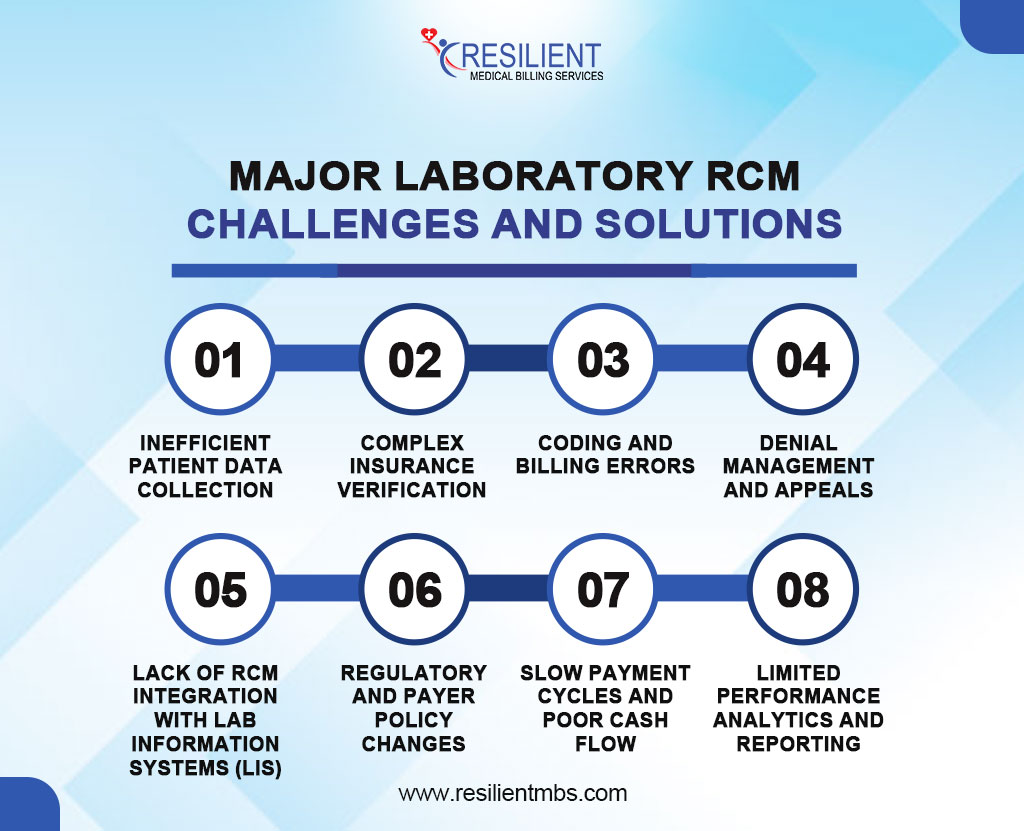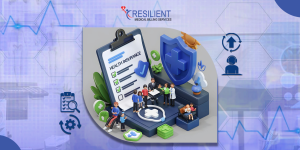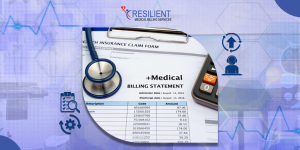Laboratory Revenue Cycle Management (RCM) is the backbone of a lab’s financial health. It covers everything from patient registration to the final payment. When done correctly, it ensures that services are billed accurately and reimbursements are received in a timely manner.
However, with rising complexities, tighter regulations, and changing payer demands, even the most efficient labs can struggle to keep pace. That’s why a strong, efficient RCM system isn’t just helpful, it’s essential.
In this blog, we’ll talk about the eight main RCM problems that labs face today and, more importantly, how you can solve them with innovative, tech-based solutions that can help you get more revenue, cut down on denials, and make things go more smoothly.
1. Inefficient Patient Data Collection
Accurate patient data is crucial to the successful submission of claims. Incomplete or incorrect demographic and insurance details often result in claim rejections or denials, directly impacting revenue and increasing the administrative burden of reprocessing claims.
Solution:
Implement automated front-end data validation tools at the point of patient intake to ensure accurate and consistent data collection. These tools cross-check information in real time, flagging discrepancies and missing fields before submission. This not only ensures data accuracy but also reduces manual errors and streamlines downstream billing processes.
2. Complex Insurance Verification
Insurance verification that is either manual or delayed frequently results in the rejection of claims, the postponement of reimbursements, or the non-payment of claims due to ineligible coverage or incorrect policy details.
Solution:
Leverage real-time insurance verification systems that instantly confirm a patient’s insurance status, coverage limits, and policy details. Integrating these systems into the laboratory’s RCM workflow reduces delays, minimises claim denials, and enhances patient satisfaction through improved transparency.
3. Coding and Billing Errors
One of the most persistent issues in laboratory RCM is the occurrence of coding and billing errors. These errors, ranging from incorrect CPT codes to mismatched patient information, can result in delayed reimbursements, claim denials, and compliance risks. Inaccuracies often stem from untrained staff, outdated coding practices, or manual data entry in lab billing services.
Solution:
To avoid these challenges, laboratories should hire trained medical coders who understand the regulations governing laboratory billing and coding. Using updated laboratory billing software assures coding and payer compliance. Modernising coding and automating repetitive billing procedures can reduce human error and improve revenue cycle accuracy for labs.
4. Denial Management and Appeals
High denial rates pose a significant challenge for RCM laboratories, often resulting from missing documentation, eligibility issues, or procedural errors. Without an effective system to manage denials, labs face revenue loss and delayed payments.
Solution:
Use a structured denial tracking and appeal process. Leverage RCM tools to categorise denials, identify root causes, and automate appeals. Regular trend analysis helps refine billing practices, boosting claim acceptance and financial performance.

5. Lack of RCM Integration with Lab Information Systems (LIS)
A lack of integration between Laboratory Information Systems (LIS) and billing platforms creates data silos, resulting in workflow inefficiencies, redundant data entry, and communication gaps. When LIS and billing systems operate independently, laboratories face increased risk of errors, slower claim processing, and poor reporting capabilities.
Solution:
LIS and billing systems can easily exchange data with integrated laboratory RCM services and software. This integration adds revenue cycle transparency, data quality, and operational efficiency. By combining clinical and financial systems, laboratories can streamline their processes and increase revenue.
6. Regulatory and Payer Policy Changes
Laboratory RCM is often disrupted by changes in rules and payer policies within the healthcare industry, which is constantly evolving. To avoid claim denials and fines, you need to swiftly embrace new rules for compliance, billing, and documentation. Following government regulations, such as HIPAA, CLIA, and Medicare, makes it even harder to comply with the rules. If you go behind, you could lose money and break the law.
Solution:
Laboratories must train staff and provide compliance education to address this issue. Adopting new rules is easier with a dependable lab billing business that follows industry regulations. These organisations have compliance teams that monitor policy changes, update billing methods, and train internal staff to ensure compliance with payer and regulatory rules.
7. Slow Payment Cycles and Poor Cash Flow
Laboratory finances are put at risk by delayed reimbursements. Extended payment cycles impair cash flow, operational planning, and the lab’s capacity to invest in new technology or extend services. Manual claim submissions, delayed follow-ups, and poor claim monitoring procedures delay payment.
Solution:
Automated claim submission and follow-up systems are essential. Real-time claim tracking, auto-generated reminders, and error detection before submission can speed up the revenue cycle with advanced lab billing software. Automation reduces human error and accelerates claim processing, thereby enhancing cash flow and improving accounts receivable ageing.
8. Limited Performance Analytics and Reporting
Without effective performance analytics, laboratories often miss financial inefficiencies and revenue leaks. Outdated systems that fail to track key performance indicators (KPIs), such as denial rates and payment timelines, make it more challenging to make informed decisions and effectively manage situations.
Solution:
Adopting RCM dashboards and analytics tools provides labs with real-time visibility into their financial performance. These tools help identify bottlenecks, benchmark progress, and support data-driven decisions to enhance revenue and operational efficiency.
Final Words
Effectively managing Laboratory RCM is essential for financial stability and operational efficiency. A reliable laboratory billing company can help resolve common challenges, such as data errors and denial management, with the right tools and strategies.
Proactive solutions reduce denials, accelerate reimbursements, and improve compliance and patient satisfaction by minimising billing issues.
Medical practices should evaluate the effectiveness of their current RCM method and consider outsourcing support to a laboratory billing company.
- Are there a lot of claim denials?
- Is the reimbursement taking longer than expected?
- Are billing systems completely linked to lab work?
If these problems sound familiar, it’s time to get help from an expert. For a full consultation or a trial of their customised laboratory RCM solutions, get in touch with Resilient MBS, a reliable medical billing firm.
Their team of experts can help you make your business run more smoothly, get more money, and make sure you stay financially stable in the long run.










